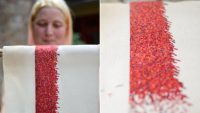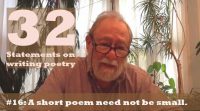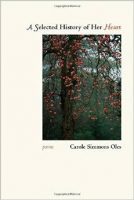September 3, 2014
Edited by David Sanders
Specimen Days
1860 – Aleksey Khomyakov, Russian poet (b. 1804), dies.
1903 – Joseph Skipsey, British poet (b. 1832), dies.
1940 – Otto V Ekelund, Swedish poet/writer (Hafvets Stjorna), dies at 59.
1962 – e[dward] e cummings, US poet (Tulips & Chimneys), dies at 67.
1995 – Alfred Earle Birney, poet, dies at 91.

here is the deepest secret nobody knows
(here is the root of the root and the bud of the bud
and the sky of the sky of a tree called life;which grows
higher than soul can hope or mind can hide)
and this is the wonder that's keeping the stars apart
i carry your heart(i carry it in my heart)
—e. e. cummings (1894–1962)
i carry your heart(i carry it in my heart)
—e. e. cummings (1894–1962)
World Poetry
Poet Ko Un receives Golden Wreath Award

Renowned South Korean poet Ko Un has won this year’s Golden Wreath, one of the world’s most authoritative awards for poets, the Korean National Commission for UNESCO said Monday. Ko received the award at the end of an annual poetry festival in the southern Macedonian town of Struga on Sunday for his overall body of work, the commission said. The 53rd edition of the Struga Poetry Evenings, an international poetry festival that has been held annually since 1962, was held on Aug. 21-24. More.
"I don’t like you, death" — Samih al-Qasim’s Final Poem
The summer sun beat down on Thursday, 21 August as thousands of Palestinians set out on a silent march in al-Rama, honoring the recently deceased poet and activistSamih al-Qasim. The 76-year-old al-Qasim, who battled cancer for three years, died late on Tuesday, 19 August. Placards bearing verses of al-Qasim’s poetry and Palestinian flags bobbed above the marching crowd, which eventually arrived at the town’s main amphitheater. Al-Qasim’s relatives, prominent religious figures and politicians all spoke. More.
Renowned South Korean poet Ko Un has won this year’s Golden Wreath, one of the world’s most authoritative poetry awards.
Recent Reviews
Miss de Beauvoir, Meet 'Alien v. Predator'
The pastiche poetry of Michael Robbins
by Jason Guriel
In the early ’80s, when it came time for the Replacements to title their third album, they went with a wink: Let It Be, the name of the Beatles classic. “[N]othing is sacred,” said Paul Westerberg, the Replacements’ chief songwriter. “[T]he Beatles were just a fine rock & roll band.” Released in 1984, the Replacements’ Let It Be had little to do with Lennon and McCartney. It concerned androgyny, music videos, and the limits of Reagan-era social media (i.e., answering machines). It blew some raspberries, too: a song about a “boner,” an ironic Kiss cover. The postmodern pranksters toyed with titling the follow up, Let It Bleed. They went with Tim instead. Michael Robbins’s second collection of poems takes its title from Simone de Beauvoir’s feminist classic, The Second Sex. More.
Puzzle Pieces: Finding the Patterns in the Poetry
Matthew Sperling looks at new poetry collections by Paul Batchelor, Oli Hazzard, and Toby Martinez de las Rivas.
by Matthew Sperling
When a new poet published by Faber & Faber starts using ampersands in his poems, you know something is afoot. In recent UK poetry, the symbol has been a stylistic identifier for “experimental” work; for Don Paterson, “the Ampersands” is a derisive nickname for pretentious avant-gardists. Yet in the opening lines of Toby Martinez de las Rivas’s remarkable first collection, Terror, we find ampersands working in the service of a lucid and spontaneous lyricism. More.
Matthew Sperling looks at new poetry collections by Paul Batchelor, Oli Hazzard, and Toby Martinez de las Rivas.
Broadsides
Empathy and the Poetic Imagination (Sections 2 and 3)
by Bruce Bond
The Poet as Barbaric
Suffering is power. It is also suffering. Pain has a defiantly private dimension and as such asserts itself in one sense as a boundary between selves. Suffering makes plain the impossibility of empathy as an absolute. Nowhere is the ambiguous subject of “appropriation” more heated as when it involves the appropriation of one’s power in the form of self-inflating assumptions about and identifications with another’s suffering. Thus the sense of violation implied by the notion of appropriation extends beyond the ethical realm into a fundamental epistemological one. Stated another way, ethics and epistemology inform each other’s resistance to the act of appropriation, particularly in difficult times when a public sensitivity to the problem of appropriation and imaginative eclipse rises. With suffering, particularly on a collective scale, the pressure of the real increases, along with the expectations that imaginative forms honor the alterity of that pressure. In extreme cases, art goes silent. More.
“Suffering makes plain the impossibility of empathy as an absolute.”
Drafts & Fragments
Homer's Iliad Poem Stitched by Bristol Student

A Bristol student is attempting to create a "visual translation in embroidery" of all 24 books of Homer's celebrated poem, the Iliad. Silvie Kilgallon works on the piece in public places and documents her progress on her blog. The conceptual artist said the Iliad was "close to her heart". More.
32 Statements about Writing Poetry by Marvin Bell:

Many of you know these, as Marvin teaches them, but they are always as powerful to me as when I first heard them. (I bolded my favorites.) And if you share, please do attribute these to Marvin Bell. More.
A Bristol student is attempting to create a “visual translation in embroidery” of all 24 books of Homer’s Iliad.
Poetry In the News
Robert Hass Wins $100,000 Poetry Prize
Robert Hass, who served as poet laureate of the United States in the mid-1990s, and won a National Book Award in 2007 and a Pulitzer Prize in 2008, has now also won the Wallace Stevens Award, a $100,000 cash stipend given by the Academy of American Poets, an organization founded in 1934 to foster an appreciation for American poetry. More.
Beyoncé, Poet

Beyoncé is a superstar. She's an amazing singer and dancer, is model-gorgeous, has an adorable daughter and fellow superstar husband Jay Z. By any measure, she's really got it all. So why tackle poetry? Well, why shoudn't she? More.
MTA to Expand Popular Poetry In Motion Program to Buses

Coming to a bus near you soon. The MTA will expand its popular Poetry in Motion program—which has placed placards bearing poems on train cars since 1992, with a four-year hiatus between 2008 and 2012—to buses, the Observer has learned. In an interview, Arts in Transit director Sandra Bloodworth told the Observer that the program would use the same poetry and art pairings as on subway trains and that their placement would be determined by “space we can capture that’s not sold [for advertising].” More.
Beyoncé, she’s really got it all. So why tackle poetry?
New Books
The Best American Poetry 2014 edited by David Lehman and Terrance Hayes
[Hardcover] Scribner, 240 pp., $35.00
Always eagerly anticipated, the 2014 volume of The Best American Poetry begins with David Lehman’s “state-of-the-art” foreword followed by an inspired introduction from Terrance Hayes on his picks for the best American poems of the past year. Following the poems is the apparatus for which the series has won acclaim: notes from the poets about the writing of their poems.
A Selected History of Her Heart: Poems by Carole Simmons Oles

[Paperback]University of New Mexico Press, 80 pp., $18.95
Travel, blood, and transgression are the materials that art shapes in these poems. Carole Simmons Oles's work moves among physical, spiritual, and metaphorical frontiers where East meets West, where relationships are forged and broken, and where a woman can now reflect on the experiences that have shaped her life.
Gabriel: A Poem by Edward Hirsch
[Hardcover ] Knopf, 96 pp., $26.95
Never has there been a book of poems quite like Gabriel, in which a short life, a bewildering death, and the unanswerable sorrow of a father come together in such a sustained elegy. This unabashed sequence speaks directly from Hirsch’s heart to our own, without sentimentality. From its opening lines—“The funeral director opened the coffin / And there he was alone / From the waist up”—Hirsch’s account is poignantly direct and open to the strange vicissitudes and tricks of grief. In propulsive three-line stanzas, he tells the story of how a once unstoppable child, who suffered from various developmental disorders, turned into an irreverent young adult, funny, rebellious, impulsive. Hirsch mixes his tale of Gabriel with the stories of other poets through the centuries who have also lost children, and expresses his feelings through theirs.
Bone Map: Poems by Sara Eliza Johnson

[Paperback] Milkweed Editions, 96 pp., $16.00
Sara Eliza Johnson's stunning, deeply visceral first collection, Bone Map (2013 National Poetry Series Winner), pulls shards of tenderness from a world on the verge of collapse, where violence and terror infuse the body, the landscape, and dreams: a handful of blackberries offered from bloodied arms, bee stings likened to pulses of sunlight, a honeycomb of marrow exposed. “All moments will shine if you cut them open. / Will glisten like entrails in the sun.”
Congotronic by Shane Book
[Paperback] University of Iowa Press, 80 pp., $18.50
At once original, strange, funny, and unnerving, Shane Book’s Congotronic takes the reader into unstable territory, where multiple layers of voice, diction, and music collide. Some of these poems have the sparse directness of a kind of bleak prayer; others mingle the earthbound rhythms of hip-hop with the will-to-transcendence of high Romanticism. Here is a world poet of the Sonic Global South sheathed in a Northern Hemispheric glow suit, high “on Coltrane, on Zeus” but also on the old and new schools of Descartes, M.I.A., Cecil Taylor, Gilbert Ryle, Freud, and Jay Z, among others—or as one poem puts it, the “aural truths.” More.
The Wheeling Year: A Poet's Field Book by Ted Kooser

[Hardcover] University of Nebraska Press, 96 pp., $14.95
Ted Kooser sees a writer’s workbooks as the stepping-stones on which a poet makes his way across the stream of experience toward a poem. Because those wobbly stones are only inches above the quotidian rush, what’s jotted there has an immediacy that is intimate and close to life. Kooser, winner of the Pultizer Prize and a former U.S. poet laureate, has filled scores of workbooks. The Wheeling Year offers a sequence of contemplative prose observations about nature, place, and time arranged according to the calendar year. Written by one of America’s most beloved poets, this book is published in the year in which Kooser turns seventy-five, with sixty years of workbooks stretching behind him. More.
Carole Simmons Oles’s work moves among physical, spiritual, and metaphorical frontiers where East meets West.
Correspondences
Joe Wenderoth
by Paola Capó-García
In Joe Wenderoth’s most recent collection of poems, If I Don’t Breathe How Do I Sleep (Wave Books, 2014), the speaker is in constant discovery of his limitations. Whether it’s a desire to travel, to offer sympathy, to miss a loved one, to avoid bureaucratic obligations, to assemble a clown, to keep in shape, “to eat of the world you live in,” the speaker visits each poem only to find more despair and more limits. “I very recently came into complete possession of where I am. / Trouble is: / having complete possession of where I am / diminishes the potential of my dramatic arc.” The speaker realizes this during “My Coronation,” where awareness is a coming to terms with playing an unsatisfying role. More.
“All of These Things Are Poetry”

An Interview with Matthea Harvey About Her Syllabus
by Stephanie Palumbo
This is part of a series of conversations with writers who teach, where we discuss how they develop an idea for a course, generate a syllabus, and conduct a class. Read the full syllabus here. Matthea Harvey is the author of five books of poetry, including Of Lamb, Modern Life, and Pity the Bathtub Its Forced Embrace of the Human Form, and two children’s books. Her newest book, If The Tabloids Are True What Are You?, features a wide variety of art forms, both poetic (sonnet, erasure, prose poems) and visual (photographs of miniatures submerged in ice cubes, embroidery depicting instruments, illustrations of mermaids with tools for tails). Harvey teaches at Sarah Lawrence College. More.
An Almost Unheard Low Note

By Lisa L. Moore
Minnie Bruce Pratt is the author of six books of poetry. Her 1990 volume, Crime Against Nature, was the Lamont Poetry Selection of the Academy of American Poets and won the Gay and Lesbian Book Award of the American Library Association. The book tells the story of Pratt’s loss of custody of her two young sons when she came out as a lesbian in the 1970s. . . . Crime Against Nature, originally published by Firebrand Books, has just been re-issued by A Midsummer Night’s Press with an introduction by Julie Enszer, a new afterword by Minnie Bruce Pratt, and the text of Pratt’s Lamont Prize acceptance speech. It is the first volume in a new series titled Sapphic Classics, a collaboration between the venerable journal Sinister Wisdom and A Midsummer Night’s Press, which aims to reprint classic collections of lesbian-feminist poetry. The following interview is an edited version of a telephone conversation that took place on May 9, 2014. More.
An Interview with Matthea Harvey About Her Syllabus
Envoi: Editor’s Notes
27 August (1962): Ted Hughes to Vicky Watling

The poet Ted Hughes writes to his cousin, Vicky, upon hearing of her elopement. At the time, Hughes and his wife, Sylvia Plath, were living in North Tawton, Devon with their two children, Frieda and Nicholas. Plath had already discovered Hughes’ affair with Assia Wevill—the couple would separate in September and the months that followed would be the most creative months of Plath’s life, as well as her final months. Wevill killed herself and her four year-old daughter (fathered by Hughes) six years after Plath’s own suicide, and in the same manner—by using the gas oven in her home. Below, Hughes discusses plans to begin writing under aliases, but no record exists of the poet ever following through with this plan. More.
Here is Ted Hughes, shortly after his 32nd birthday, still a young man, three books of poetry to his name along with a young family, and a month away from separating from his wife although he does not allude to any discord in this letter to his cousin. In fact, he talks of enlisting Plath as a conspirator in his plan.
His plan at this moment, as described in this letter, was to adopt an alias or two, in order to create a persona under which to publish his poetry as a foil for the poetry of Ted Hughes, if I've got that right. Part of that might have been a young man's bravado and ego in constructing outrageous schemes for his public self. And the desire to find a way to free oneself from one's own constraints and those that have been applied by others is profound and real and not uncommon. But some of the rationale for creating this "secret life" must surely have been a result of the fracturing of his personal world. In hindsight it looks to be a case of "putting the emPHASis on the wrong syLLABle," but it also shows evidence, or so it seems, of the rent in the fabric of his relationship with Plath that would alter the face of English poetry.
The poet Ted Hughes writes to his cousin, Vicky, upon hearing of her elopement.